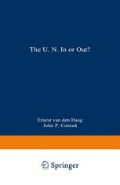Abstract
When Woodrow Wilson created the League of Nations after the First World War and pressed the victorious allies to join, the U.S. Congress, to his chagrin, had the wisdom to stay out. President Wilson was unable to muster the required two-thirds majority in the Senate. He had persuaded Americans that the (first) World War was “the war to end all wars” and “to make the world safe for democracy.” After victory, he felt he had to offer something that at least might look as though these promises could and would be kept, something new that went beyond the traditional processes of diplomacy and international relations. Perhaps President Wilson actually believed that the League of Nations would be an instrument for peace. Perhaps he shared the hopes he stimulated. Whether one believes that he did depends on whether one rates higher his intelligence (which would lead him not to take the League, or his own slogans, seriously) or his honesty (which would lead him not to allege that he did when he did not). At any rate, wiser heads prevailed and we did not join.
Access this chapter
Tax calculation will be finalised at checkout
Purchases are for personal use only
Preview
Unable to display preview. Download preview PDF.
Notes
The complex and tragic history of the Senate’s rejection of the Versailles Treaty, and with it the League of Nations, has been often told. For a detailed account, outlining the obduracy of both sides in the conflict, see Thomas A. Bailey, Woodrow Wilson and the Great Betrayal (New York: Macmillan, 1945), especially pp. 38–52. The sympathetic narrative by Herbert Hoover, himself a president who also suffered a humiliating defeat, reviews these events with much admiration for Wilson and little for the “irreconcilables.” See The Ordeal of Woodrow Wilson (New York: McGraw-Hill, 1958), pp. 265–303. Note that Hoover worked closely with Wilson during the war and had personal knowledge of Wilson’s thinking about the League.
For a brief account of the history of the idea, see F. H. Hinsley, Power and the Pursuit of Peace (Cambridge University Press, 1963), pp. 13–149.
Quoted by Hoover, note 1, pp. 302–303.
See pp. 32–33, 147, above.
See Chapter 2, pp. 88–90.
Conor Cruise O’Brien, “The Very Model of a Secretary-General,” Times Literary Supplement, No. 4,320, 17(January 1986), pp. 63–64.
Mikhail Sergeyevich Gorbachev, Political Report of the CPSU Central Committee to the 27th Congress of the Communist Party of the Soviet Union, February 25, 1986 (Moscow: Novosti Press Agency Publishing House, 1986), p. 4.
My use of this word seems to upset my opponent. For the benefit of his vocabulary: “Wit 1. The seat of consciousness or thought, the mind. 2. The faculty of thinking and reasoning in general; mental capacity, intellect, reason” {Shorter Oxford English Dictionary). I do not mean that Mr. Gorbachev is in any way an amusing man.
At the time of the transfer of power from the Dutch government to the new Indonesian Republic, the Netherlands was maintaining an army of 80,000 home troops and 65,000 indigenous troops, mostly Indonesian. Alistair M. Taylor, Indonesian Independence and the United Nations (London: Stevens, 1960), p. 413.
Ibid., pp. 211–212.
London: Hutchinson, 1962.
No nation, not even Belgium, recognized the independence of Katanga.
For a more detached and briefer account of the intricate situation in the Congo, see Andrew Boyd, United Nations: Piety, Truth, and Myth (London: Penguin Books, 1964), pp. 121–159. For all the details, see Brian Urquhart, Hammarskjöld (New York: Harper & Row, 1984), pp. 389–515, 545–597.
O’Brien, note 5, p. 347.
Urquhart, p. 567.
Opération des Nations Unies au Congo.
For an eye-witness account, see O’Brien, note 5, pp. 320–326.
Quoted in John Milton Cooper, The Warrior and the Priest (Cambridge: Harvard University Press, 1983), pp. 327–328.
Ibid., p. 36.
Rights and permissions
Copyright information
© 1987 Ernest van den Haag and John P. Conrad
About this chapter
Cite this chapter
van den Haag, E., Conrad, J.P. (1987). The Dream and the Reality. In: The U.N. In or Out?. Springer, Boston, MA. https://doi.org/10.1007/978-1-4899-5984-3_5
Download citation
DOI: https://doi.org/10.1007/978-1-4899-5984-3_5
Publisher Name: Springer, Boston, MA
Print ISBN: 978-0-306-42524-0
Online ISBN: 978-1-4899-5984-3
eBook Packages: Springer Book Archive

